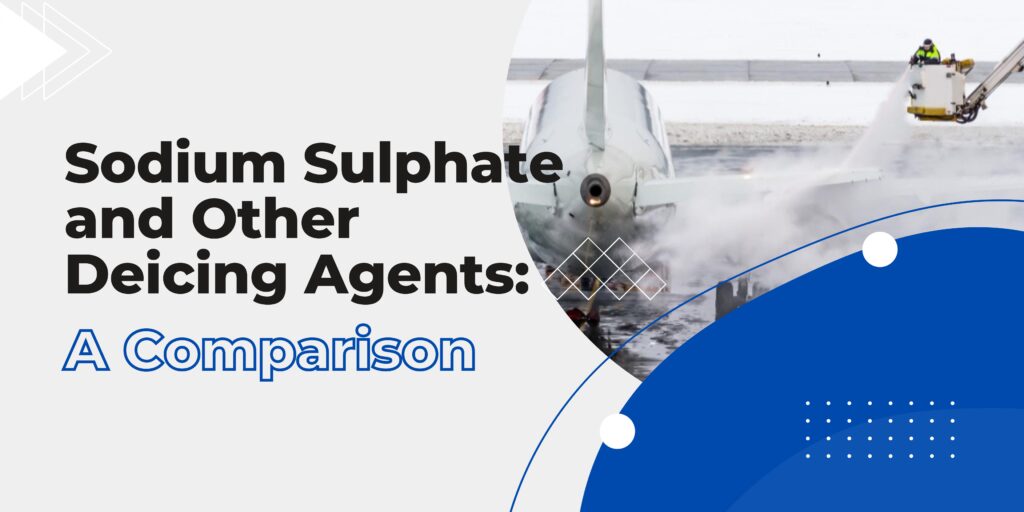
As winter arrives, it brings both the enchantment of snowy landscapes and the challenges of icy roads and walkways. The importance of effective deicing agents becomes paramount to maintain safe travel conditions during the colder months. Among these agents, sodium sulphate stands out, demonstrating promise as a potential solution. In this article, we delve into a comprehensive comparative study of sodium sulphate and other deicing agents, exploring their efficiency, environmental impact, cost-effectiveness, and practical applications.
Understanding Deicing Agents
Deicing agents are substances strategically used to combat ice and snow accumulation on various surfaces, particularly roads and sidewalks. By lowering the freezing point of water, these agents prevent ice formation or aid in breaking down existing ice, promoting safer travel in cold weather-prone regions.
Types of Deicing Agents
- Sodium Chloride (Rock Salt): Sodium chloride, or rock salt, is a widely used and cost-effective deicing agent due to its efficient ice-melting properties. However, its corrosive impact on infrastructure and vegetation raises environmental concerns.
- Calcium Magnesium Acetate (CMA): CMA, an eco-friendly option, is less corrosive than traditional salt and is biodegradable, making it less harmful to vegetation and concrete.
- Potassium Acetate: Known for its efficiency at lower temperatures and low corrosiveness, potassium acetate is a suitable alternative to sodium chloride for specific applications.
- Magnesium Chloride: Highly effective at low temperatures, magnesium chloride is less harmful to the environment compared to sodium chloride.
- Sodium Suphate: Sodium sulphate, gaining attention as an emerging deicing agent, shows potential in ice melting and has notable environmental benefits.
Sodium Sulphate vs. Other Deicing Agents
Efficiency in Ice Melting
Sodium sulphate exhibits ice-melting capabilities comparable to sodium chloride and magnesium chloride, making it a viable choice for effectively combating icy conditions.
Cost-effectiveness
Sodium sulphate offers a cost-effective alternative to some traditional deicing agents, making it an attractive option for budget-conscious applications, thereby enhancing its practicality. Also read our article on the influence of international trade on sodium sulphate price.
Corrosiveness
One of the notable advantages of sodium sulphate is its lower corrosiveness compared to sodium chloride, leading to reduced damage to vehicles, infrastructure, and metal structures.
Environmental Impact
Sodium sulphate’s lower environmental impact is a significant advantage. It is less harmful to vegetation, water bodies, and soil quality compared to traditional salt.
- Reduced Corrosion: Sodium sulphate significantly reduces corrosion, thus minimizing the need for frequent vehicle and infrastructure repairs and replacements.
- Less Harm to Vegetation: Its reduced impact on vegetation, especially along roadways, preserves the local ecosystem.
- Reduced Water Contamination: Sodium sulphate poses a lower risk of contaminating groundwater and surface water sources, contributing to improved water quality.

Practical Applications and Considerations
In practical terms, sodium sulphate proves to be a versatile and practical deicing agent suitable for various applications:
- Road Maintenance: Sodium sulphate can be effectively used for clearing roads, ensuring safer travels during icy conditions while minimizing infrastructure damage.
- Eco-Friendly Solutions: Municipalities and organizations seeking more eco-friendly deicing options can adopt sodium sulphate as part of their sustainability initiatives.
- Residential Use: Homeowners can also benefit from using sodium sulphate for deicing driveways and walkways due to its cost-effectiveness and lower environmental impact.
Conclusion
In the pursuit of safe and sustainable winter road maintenance practices, sodium sulphate emerges as a promising deicing agent. Its efficient ice-melting properties, cost-effectiveness, reduced corrosiveness, and lower environmental impact position it as a viable choice for cold weather conditions. Considering its advantages and comparing them with traditional deicing agents will guide its optimal use, contributing to safer and more sustainable winter travel experiences.




